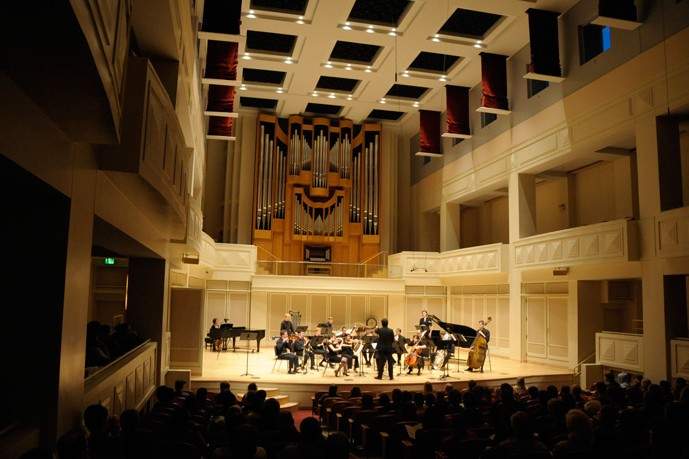
The IU New Music Ensemble under the baton of David Dzubay will perform three twenty-first century works, joined by soprano Lindsey McLennan and faculty members Jeff Nelsen, horn and John Rommel, trumpet.
The concert will begin with a work by Paula Matthusen, a composer and member of the faculty at Wesleyan University. the art of disappearing for chamber orchestra was premiered in the Netherlands in 2006. Matthusen is known for her electroacoustic works, and the art of disappearing is no exception. The work is scored for both conventional instruments and fixed media elements, also called tape. The fixed media uses electric guitar sounds, another contemporary influence that Matthusen draws on frequently.
Next, the NME will premiere a work by director David Dzubay, titled Producing for a While. Scored for chamber orchestra, soprano, and several "producers," the title comes from the text by contemporary poet Julie Choffel. Dzubay first encountered Choffel's work while participating in "Voices Up: New Music for New Poetry" at Fordham University. He was also inspired to set two other poems from the same group for soprano, cello and piano.
Matthias Pintscher's Sonic Eclipse, a work in three movements for trumpet, horn and chamber ensemble, was completed in 2010. As suggested by the title, the work is intended to portray an eclipse with sound. Pintscher describes his approach this way:
"The musical idea is that in the first piece, the trumpet, and in the second, the horn, take over a solo function... finally the ensemble is also drawn in, so that everything merges into one voice, one instrument and sound gesture, then subsequently also falls apart. Figuratively, this corresponds exactly to an eclipse."
The titles of the movements draw further on the composer's astronomical inspiration. The first two movements, "celestial object I" and "celestial object II" introduce themes in the horn and trumpet that represent the two celestial bodies. The third movement, "occultation" takes its name from the term for the moment when the the two bodies cross paths in the sky. In the music, the themes from the first two movements mix, and as the composer stated, part, to create a Sonic Eclipse.
The NME is sure to present an able and engaging performance of these new works, which will encourage audience members to turn their ears toward the future.






